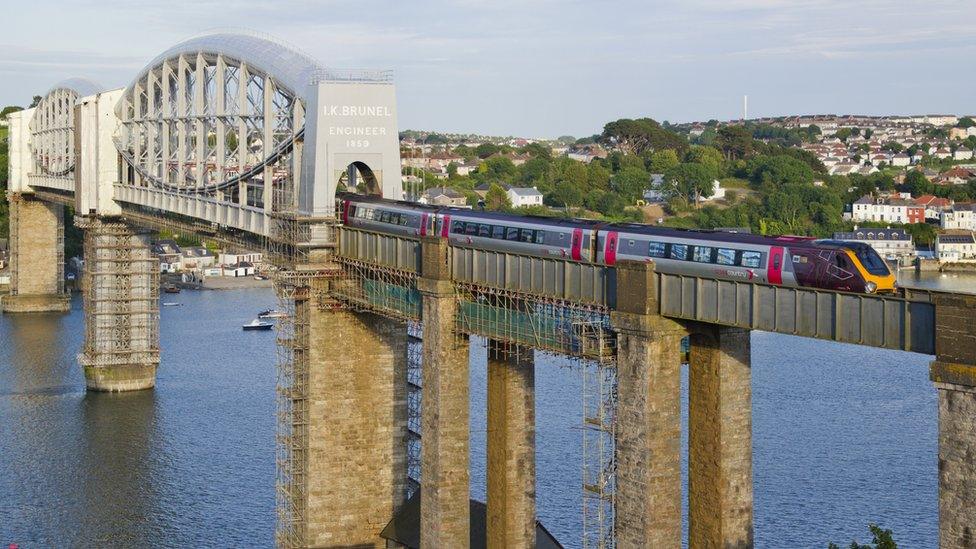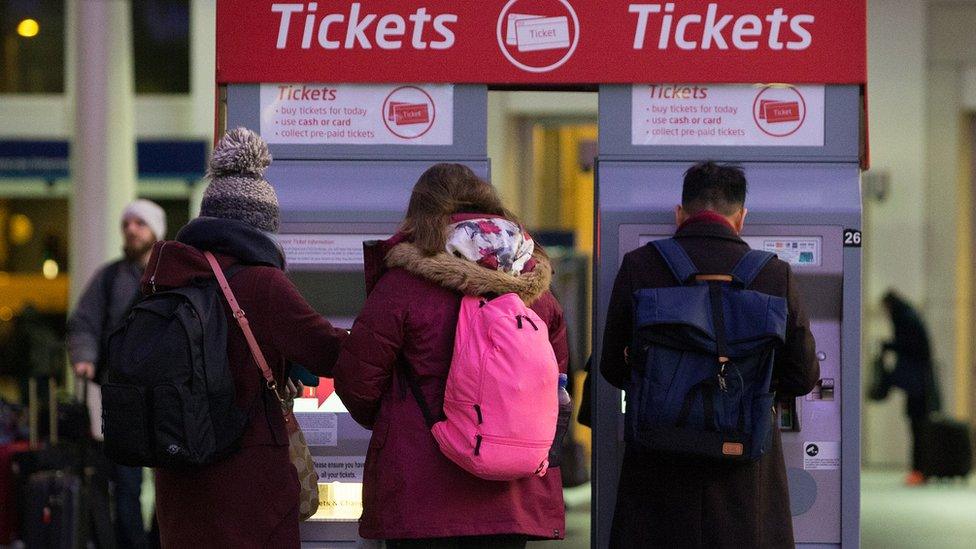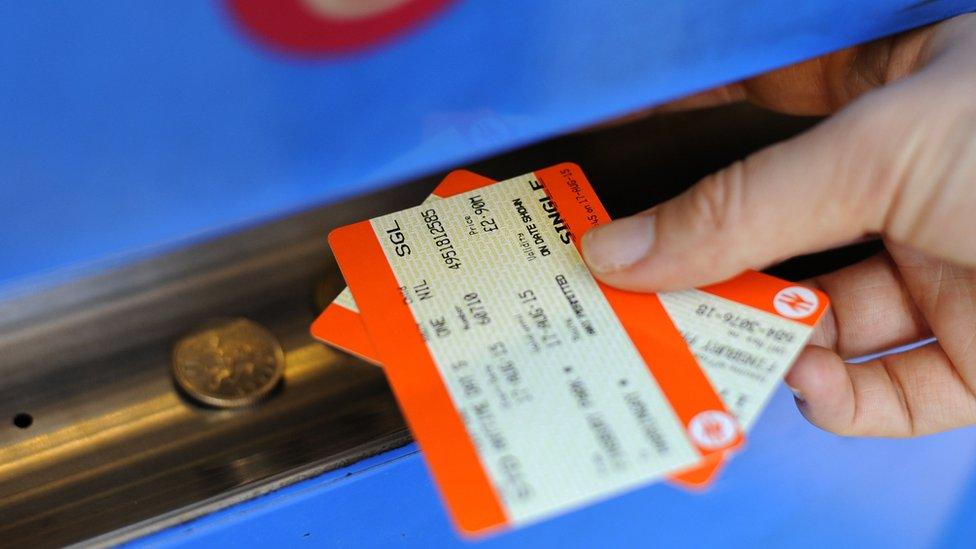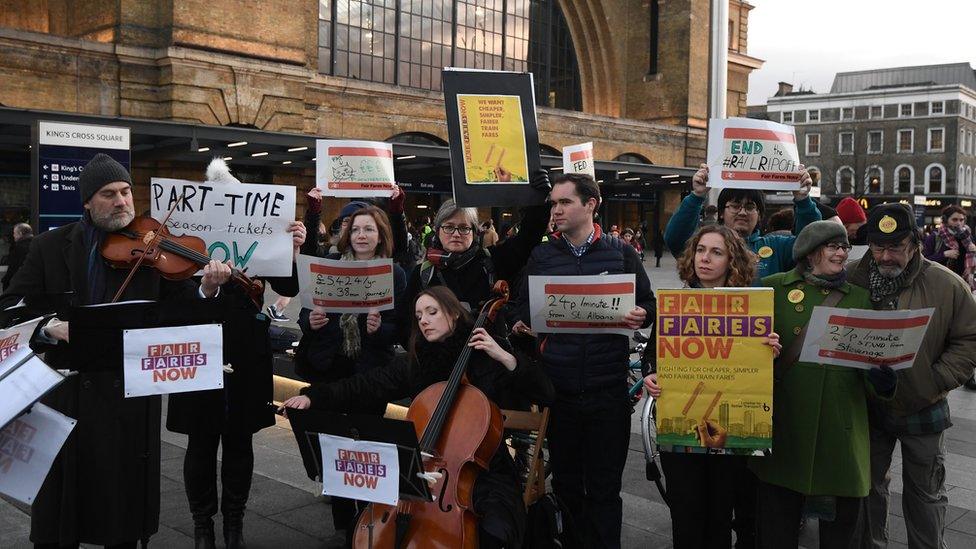Cross-country train fares to be hundreds of pounds cheaper
- Published
- comments

Routes from Scotland to south-west England should see cheaper fares
Passengers using cross-country train routes could save up to £260 a journey, under a trial scheme to simplify fares.
The Rail Delivery Group (RDG), which represents train operators, says the 16 million fares currently on offer are "baffling" for passengers.
It wants to ensure passengers are offered the cheapest possible fares.
The trial, starting from May, will initially benefit people travelling between Scotland and south-west England.
A traveller buying an off-peak return from Wick, in northern Scotland, to Par, in Cornwall, can currently pay up to £342.50, although in practice few people pay that amount.
However, by buying six separate fares for each leg of the journey, passengers can pay as little as £80 for the same trip.
That would involve buying tickets from Wick to Inverness, Inverness to Edinburgh and Edinburgh to Par.
The RDG says the potential saving of £262 will soon be offered to customers automatically.
CrossCountry Trains, the main operator taking part in the trials, may eventually offer savings on other routes as well.
'Fares to trust'
Passengers travelling between London and Glasgow, or London and Edinburgh on Virgin Trains, will also benefit from clearer pricing.
Operators currently have to offer a return fare between these cities, which is regulated by the government.
But the RDG says it would be more transparent - and possibly cheaper - for commuters if single fares were regulated instead.
It wants more booking of single fares - at ticket offices and ticket machines, as well as on the internet.

Ticket machines will be upgraded to show the cheapest fares
Ticket machines on stations will also be updated, to make sure they show the cheapest fares available.
"We're determined to overhaul the system to cut out red-tape, jargon and complication to make it easier for customers to buy fares they can trust, including from ticket machines," said Jacqueline Starr, RDG director of customer experience.
The trial will also see the removal of some historic fares which do not make sense.

Why are UK rail fares so complicated?
Ben Morris, business reporter
In the British Rail era, rail fares were a relatively simple affair, with ticket prices worked out on a cost-per mile basis.
But in the 1990s, in an effort to make the network more efficient, the operation of rail services was handed to private train operating companies (Tocs).
The Tocs were given some freedom to set ticket prices, with advanced ticket bookings particularly important to them, as it helps them to keep their trains full.
To protect passengers, other fares were regulated, including season tickets and off-peak fares.
The result is a patchwork of fares, that becomes even more complicated when a passenger wants to cross several train regions.
Savvy travellers have been taking advantage of this by splitting their journey into several tickets, rather than one through-ticket.
Today's scheme aims to make those savings available to everyone.

'Hidden fares'
At the moment passengers travelling between London St Pancras and Sheffield pay extra to travel via Grantham, for example, even though it takes longer.
Such fares date back to the pre-privatisation era of British Rail.
News of the trial was welcomed by passenger groups.
"What's clear from our research is that passengers find the ticketing system far too complex," said Anthony Smith, chief executive of Transport Focus.
"The presence of cheaper fares that are 'hidden' in the system really damages trust between passengers and train companies."
Protests
However Martin Lewis, the founder of MoneySavingExpert, said more needed to be done.
"It's quite simple. When you book a rail ticket, whether it's in a station or online, people should be given the cheapest price available at that time for their chosen journey.
"These changes will not make that happen. While it is certainly a move in the right direction, people cannot have the confidence that if they book a ticket, they will be paying the best price," he said.
The price of average train fares - including regulated and unregulated tickets - went up by 2.3% in January, even though consumer prices rose by just 1.6% last year.
The rise led to protests by passengers and rail unions.
- Published2 January 2017

- Published3 January 2017
